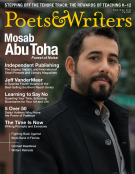Deborah Jackson Taffa
Age: 55. Residence: Santa Fe. Book: Whiskey Tender (Harper, February 2024), a multifaceted memoir exploring identity, inheritance, systemic oppression, assimilation, and American history through the lens of a mixed-tribe Native girl with an inviolable spirit. Agent: Samantha Shea. Editor: Jenny Xu.

When my parents left their wedding reception, Mom was sober. Dad, of course, drove. He sped towards Fourth Avenue, the main thoroughfare in Yuma, cutting into the opposite lane on corners, fishtailing with a groom’s finesse. Mom grew scared. She hiked up her wedding dress, reached her long leg over his thigh, and stomped the brake with her high heel shoe.
The tires locked up. The car swung wide to the right, before spinning them all the way around to the left, showing them the surprised expressions of people in other cars. “It was like we were riding on the Tilt-A-Whirl at the Yuma County Fair,” Mom said.
The car slammed into the side of a busy downtown bar. The Plymouth’s front end was mangled. Steam poured out of the radiator. It was a Sunday afternoon in April 1963, and the day was still light. Afternoon drinkers came flowing out of the bar’s smoky interior like rice throwers out of a cathedral in a haze of incense and prayer. Being the eldest of fifteen kids had made Mom conspicuous in this small town, and the bar was her father Juan’s favorite, so some of the regulars and barflies realized she was a Herrera girl and wanted to know if she was okay.
Sirens started up in the distance. A couple of biker chicks helped Mom out of the car, and she stood with them on the sidewalk in front, staring at the damaged headlight and hood. In her hurry to get out, she’d caught the train of her wedding dress in the door, and it had ripped. When she saw the torn fabric, she started crying. She told us, “I could see your dad through the window of the car, with his forehead rested on the wheel, and I knew exactly what he was thinking.”
Dad was from the Yuma Reservation, across the train tracks and river, and he was worried the town cops were going to book him again. But when the cops pulled up at the accident scene and looked at Mom—plopped on the curb in a puff of white satin, mascara running down her cheeks—they decided to be merciful and let Dad go. Mom said they felt sorry for her because she was a good local Catholic girl who’d married a crazy Indian.
When Dad walked in the front door and heard her telling us the story, he laughed and said she was wrong. He said the cops let him go, not because they pitied her, but because Mom was beautiful, and pretty people got away with shit. He pulled off his black boots and lifted his holey socks onto the coffee table. He put his arm around her and said getting away scot-free on their wedding day was the first sign Mom’s charm would work magic in his life like a lucky rabbit’s foot or a powerful tattoo.
He reminded Mom how romantic he’d been at their wedding, how he’d refused to let her sisters decorate the car with Do-It-Yourself flowers because the phony tissue paper looked too common for a woman of her caliber. Instead, he and his brothers had performed a top-secret midnight operation, sneaking into St. Thomas Indian Mission’s garden on the reservation where they cut a bunch of roses to string over the roof of the car.
Mom groaned—“Don’t brag about stealing from the church!”—but the two of them laughed, and Dad went in the kitchen to grab a snack.
Mom’s protestations never fooled me. She loved the memory of the stolen roses, as well as Dad’s claim that her beauty swayed the cops, but what made her light up especially was the way he called her his lucky charm.
This is how my parents twisted bad things around, seeing the appearances of events in fun house mirrors, stretching memories tall and pretty when they were really goofy and squat. They knew a story could be told in various ways, and this is how they chose to shape theirs—and how they would teach me to shape mine as well—by molding their wedding day car accident into their first blessing as a couple.
Adapted from the book Whiskey Tender: A Memoir by Deborah Jackson Taffa. Copyright © 2024 by Deborah Taffa. Reprinted by permission of Harper, an imprint of HarperCollins Publishers.
Author photo: Simone Taffa








